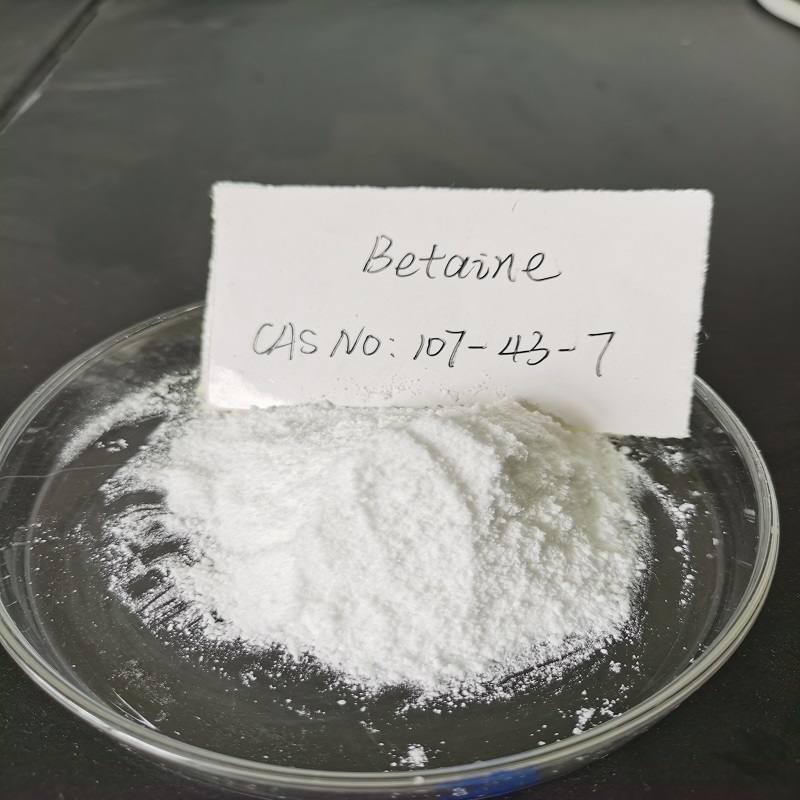Agriculture, Food, Pharmaceutical
Do you have questions?
We unleash your business potential by maximize the business innovation.
Send EmailBetaine Hydrochloride, Acinorm, Acipepsol, 590-46-5
CAS: 590-46-5
Molecular Formula: C5H12ClNO2
Names and Identifiers
| Name | Betaine hydrochloride |
| Synonyms | Acinorm Acipepsol Betaine HCl Acidol-Pepsin aciventralforte BETAINE CHLORIDE Aciventral forte acidolhydrochloride Betaine hydrochloride Betaine Hydrochloride, AR Ammonium, (carboxymethyl)trimethyl-, chloride carboxy-N,N,N-trimethylmethanaminium chloride 1-Carboxy-N,N,N-trimethylmethanaminium chloride |
| CAS | 590-46-5 |
| EINECS | 209-683-1 |
| InChI | InChI=1/C5H11NO2.ClH/c1-6(2,3)4-5(7)8;/h4H2,1-3H3;1H/p-1 |
| InChIKey | HOPSCVCBEOCPJZ-UHFFFAOYSA-N |
Physico-chemical Properties
| Molecular Formula | C5H12ClNO2 |
| Molar Mass | 153.61 |
| Density | 1.29[at 20℃] |
| Melting Point | 241-242°C(lit.) |
| Specific Rotation(α) | -29.51 (H2O) |
| Water Solubility | 64.7 g/100 mL (25 ºC) |
| Solubility | Easily soluble in water and ethanol, hardly soluble in ether and chloroform. |
| Vapor Presure | 0Pa at 25℃ |
| Appearance | White to yellowish crystalline powder |
| Color | Colorless to white |
| Merck | 14,1179 |
| BRN | 3916181 |
| PH | 1 (50g/l, H2O, 20℃) |
| Storage Condition | room temp |
| Sensitive | Easily absorbing moisture |
| MDL | MFCD00011903 |
| Physical and Chemical Properties | Melting point 241-242°C. Water-soluble 64.7g/100 mL (25°C). |
| Use | Used as food, feed additives, pharmaceutical grade for gastrointestinal function regulator |
Risk and Safety
| Risk Codes | R36 - Irritating to the eyes R36/37/38 - Irritating to eyes, respiratory system and skin. R20/21/22 - Harmful by inhalation, in contact with skin and if swallowed. |
| Safety Description | S26 - In case of contact with eyes, rinse immediately with plenty of water and seek medical advice. S39 - Wear eye / face protection. S24/25 - Avoid contact with skin and eyes. S36 - Wear suitable protective clothing. |
| WGK Germany | 3 |
| RTECS | BP3136000 |
| FLUKA BRAND F CODES | 3-10 |
| TSCA | Yes |
| HS Code | 29239000 |
Upstream Downstream Industry
| Raw Materials | Chloroacetic acid Trimethylamine Sodium hydroxide |
Reference Information
| FEMA | 4223 | BETAINE |
| LogP | -4.93 |
| Introduction | Betaine hydrochloride is an acidic form of betaine, which is found in cereals and certain foods similar to vitamins. Doctors generally recommend supplementation for those with a deficiency of stomach acid. |
| Source | is most abundant in fish, legumes and beets. Betaine citric acid and aspartic acid betaine are in the form of betaine products and are mainly used to improve liver function. |
| Functional Role | Betaine functions closely with folic acid, vitamin B12, S-adenosylmethionine (SAMe) and choline, each of these compounds has a "methyl-donor" role, providing methyl groups to participate in biochemical reactions necessary for the human body. Betaine methyl groups are important for liver function, cell replication and detoxification reactions. Betaine is also involved in the synthesis of carnitine in vivo and protects the kidneys from damage. |
| Drug interactions | Betaine hydrochloride should not be taken by people taking non-steroidal anti-inflammatory drugs (NSAIDs) and cortisone-like drugs, in order to avoid gastric ulcer. Betaine hydrochloride promotes the absorption of minerals and certain nutrients. |
| Use | Betaine hydrochloride is an efficient methyl donor, which can partially replace methionine and choline chloride and reduce feed cost. The methyl supply efficiency of betaine hydrochloride is 50% times that of 1.8 choline chloride and 2.6 times that of methionine. The combination of Anticoccidial drugs and Betaine hydrochloride can buffer the change of ion balance, so as to improve the nutrient absorption rate and promote the growth of poultry. In the premix and concentrate, betaine hydrochloride can protect the stability of VA and VB, and improve the use effect. An amphoteric surfactant. Used as food and feed additives, pharmaceutical grade for gastrointestinal function regulator organic synthesis. Welding. Resin treatment. A feed additive that is beneficial to the growth of animals. |
| Application | betaine, belonging to quaternary ammonium alkaloids, is a new type of fine chemicals, can be widely used in food, medicine, daily Chemical, printing and dyeing, chemical and other fields. Betaine hydrochloride, is an efficient, high quality, economic, widely used in livestock, poultry, aquaculture, feeding induction and other nutritional additives. |
| autoignition temperature | 400°C |


